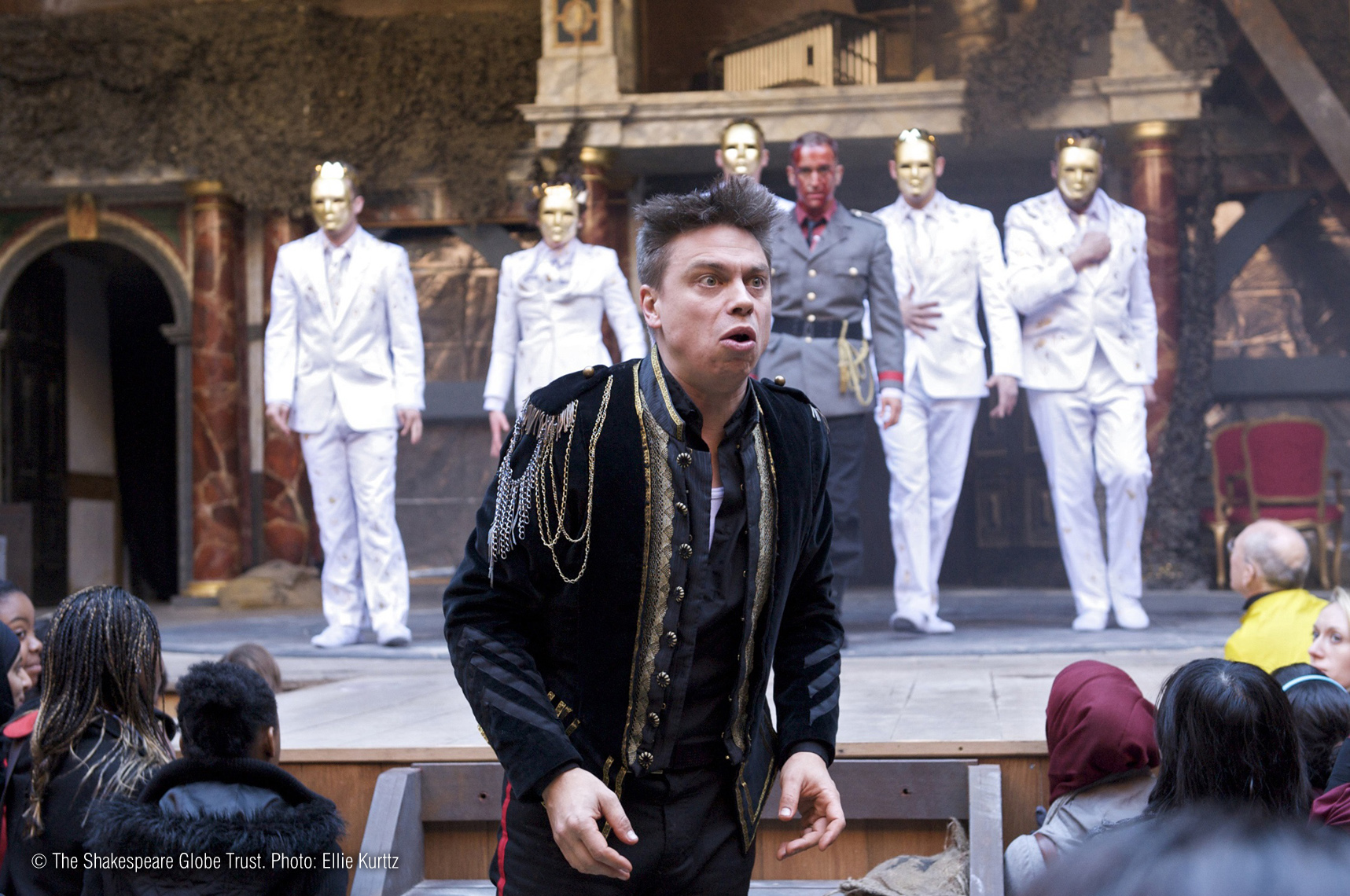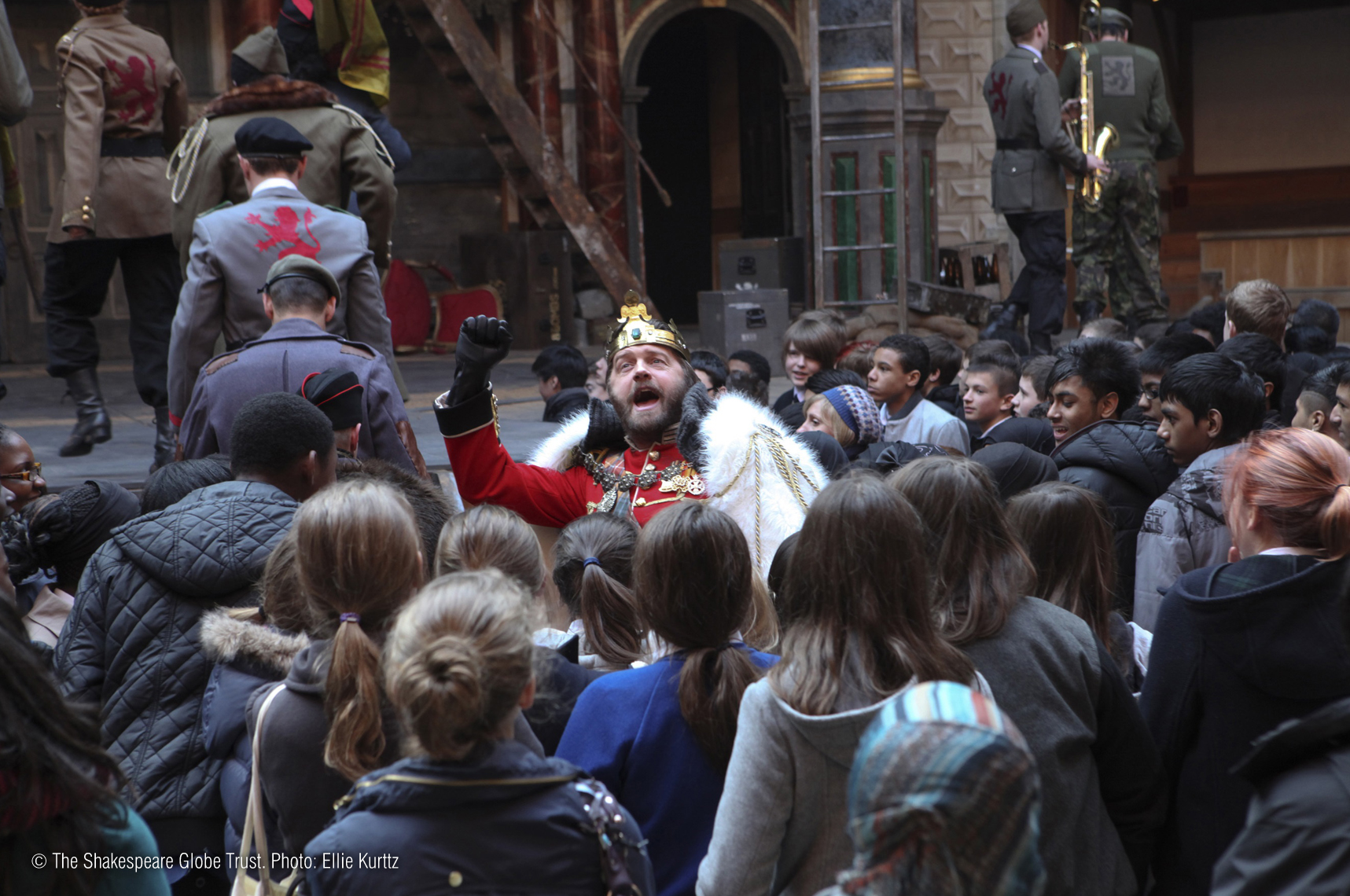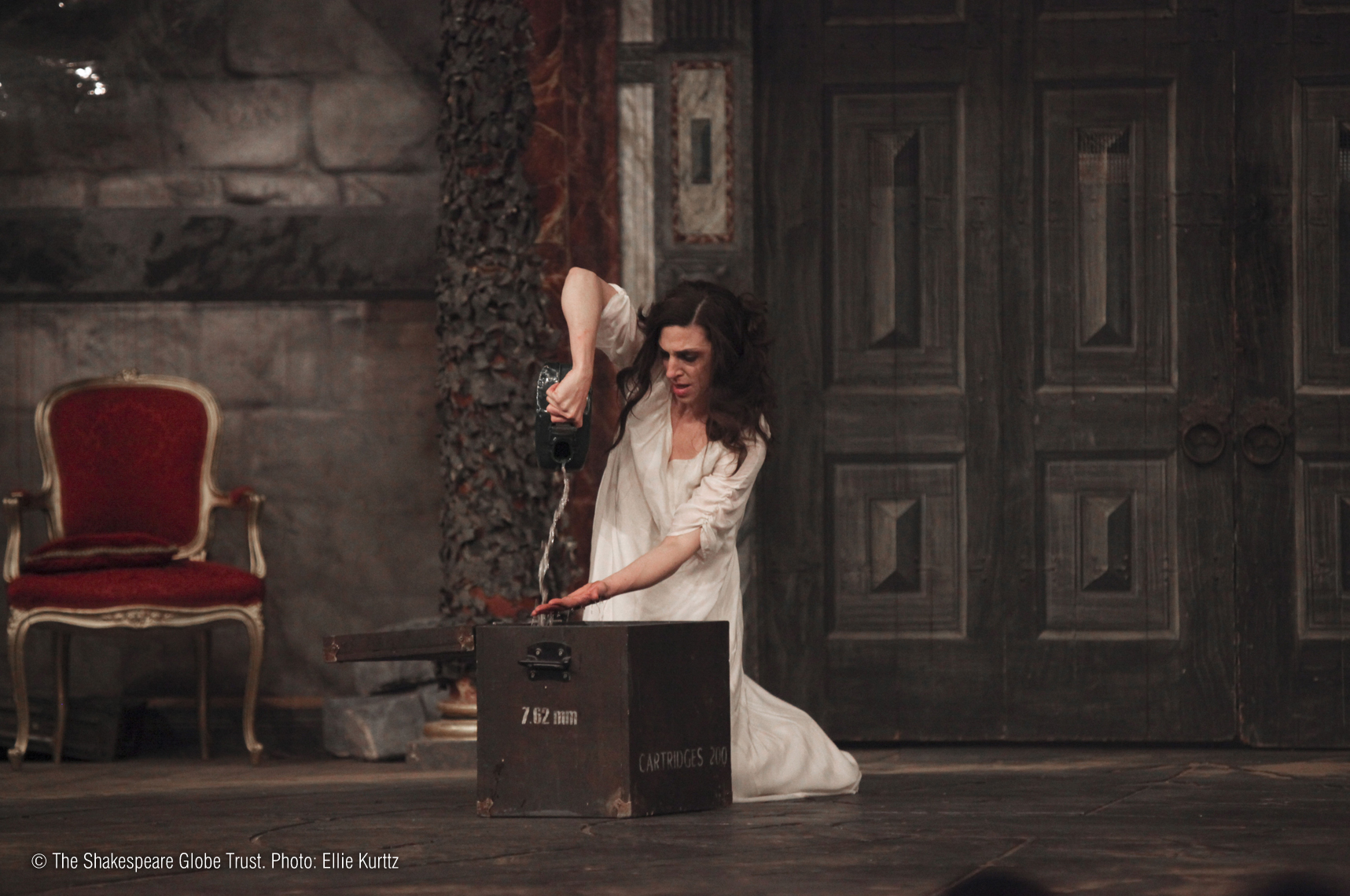In these lessons, students will engage with the themes and ideas at the heart of the text, including deception, ambition, and guilt. Tasks include: tracking these themes throughout the play, drawing out key quotations; creative writing on Lady Macbeth's sleep walking, in the character of her doctor; and a list of practice exam questions with an emphasis on themes and motifs.
In order to benefit fully from these lesson plans, we recommend you use them in the following order:
If you would like to teach the play in greater detail, use these advanced KS4/5 Lesson Plans. If students are new to the play, we suggest you start with the introductory KS3 Lesson Plans.
These lesson plans are available in the Downloads section at the bottom of this page. To download resources, you must be logged in. Sign up for free to access this and other exclusive features. Activities mentioned in these resources are available in a separate downloadable 'Student Booklet', also at the bottom of this page. The 'Teachers' Guide' download explains how best to use Teach Shakespeare and also contains a bibliography and appendices referencing the resources used throughout.
Key Questions for Students:
Can I identify why the themes of appearance and reality are important and pick out examples from throughout the text?
Can I explain the importance of these examples by placing them in the context of the play as a whole and the overall development of these themes?
Key words: appearance, deception, plot, reality, theme, thought-tracking
Prologue: Opening Discussion
Introduce the theme of appearance and reality and display a quiz-show style board numbered 1-25. Students should pick one square and if it reveals a quotation, they should place that quotation in context and talk about how it connects with the theme of appearance and reality. As a class, students should try to make a full line of five quotations across or down the board. But beware, as some squares will have something much more dangerous behind them (pictures of daggers, witches, blood, etc.) Give students a fixed amount of time or a fixed number of attempts to increase the excitement! Some suggested quotations you could use are included in the Asides.
Enter the Players: Group Tasks
1) Tracking the theme
Students should use the mindmap to help them track the theme of ‘appearance and reality’ in the play. Students could be divided into five groups, each taking one Act from the play. They should read through it carefully, looking for evidence before reporting back. Students could also prepare a sheet of evidence that can be made accessible to all their classmates as a revision aid. Students should aim to keep quotations short (under 10 words), and write a brief commentary about how their quotation links to the overall theme.
2) Exploring more deeply through drama and creative writing
The following drama activities can support students’ further explorations of this theme:
- Yes/No game: One student is chosen or volunteers to answer questions. They must answer any questions asked of them by the rest of the class without saying ‘Yes’ or ‘No’, and they should aim to be as inventive as possible. The discussion that follows this game could encourage students to think about how language can be used to get around giving a direct and simple truthful answer. Jessica Swale suggests this activity can work ‘as an effective prelude to playwriting exercises’.
- Thought tracking: Groups of students create freeze frames from key points in the play. Assign students speaking parts from a particular scene or part of a scene. Within each tableau, each individual student should be ready to come to life and speak if they are shown a card by another student from the audience:
- the mouth card means that they should say or paraphrase a line they say in the scene (not an aside)
- the head card means that they should talk about what they are really thinking
- the heart card means that they should talk about how they are feeling at this moment
3) Interpreting and staging key scenes
Assign to groups of students the task of staging a scene where they feel this theme is crucially important, e.g. Act 1 Scene 3, Act 1 Scene 4 or Act 2 Scene 2. Afterwards, reflect as a group and as a whole class on how well the various performances explored the themes of appearance and reality and how this was achieved.

Exeunt: Closing Questions for Students
Why are appearance and reality important themes in the play?
How would I describe the development of these themes throughout the play?
How do these themes link to the other major themes in Macbeth that I have studied?
Suggested plenary activity…
Everyone in the class picks out three key moments that they think are particularly crucial when thinking about the themes of appearance and reality. Compare findings.
Asides: Further Resources
Quotations you could use in the Prologue activity:
- “Fair is foul, and foul is fair”
- “Are ye fantastical, or that indeed/Which outwardly ye show?”
- “…why do you dress me /In borrow’d robes?”
- “There’s no art/To find the mind’s construction in the face.”
- “Let not light see my black and deep desires.”
- “…look like th’innocent flower,? But be the serpent under it.”
- “This castle hath a pleasant seat.”
- “False face must hide what the false heart doth know.”
- “…art thou a dagger of the mind/A false creation”
- “If he do bleed,/I’ll gild the faces of the grooms withal,/For it must seem their guilt.”
- “…sleek o’er your rugged looks;/ Be bright and jovial among your guests to-night.”
- “This is the very painting of your fear.”
- “A great perturbation in nature, to receive at once the benefit of sleep, and do the benefits of watching.’’
- “…now does he feel his title/ Hang loose about him, like a giant’s robe/Upon a dwarfish thief.”
- “As I did stand my watch upon the hill,/I look’d toward Birnam, and anon, methought,/The wood began to move.”
Epilogue: Teacher's Note
Additional materials about studying the witches can be found in the Text in Performance, Language and Context sections.
Key Questions for Students:
Can I identify why the themes of power and ambition are important and pick out examples from throughout the text?
Can I explain the importance of these examples by placing them in the context of the play as a whole and the overall development of this theme?
Key words: allegiance, ambition, divine right of kings, heir, hierarchy, legitimacy, power, sovereign, status, succession, theme, tyrant
Prologue: Opening Discussion
Ask students to complete a vocabulary exercise matching the following words with definitions:
power – the ability to do something or direct what others do
sovereign – a supreme ruler
heir – a person legally entitled to the property or rank of another person when that person dies
tyrant – a cruel and oppressive ruler
ambition – desire and determination to be successful
succession – the process of inheriting a title, office or property
legitimacy - lawfulness
the divine right of kings – the idea that the monarch’s right to rule comes directly from will of God
allegiance – the loyalty of a subject to his or her ruler
dynasty – a sequence of rulers from the same family
Then ask students to choose a word and write one or two sentences about Macbeth using that word. Students should share their sentences with their partners. The partner awards:
- 1 point for correct use of the word in a sentence
- another 1 point for using the word in reference to Macbeth, and
- up to another 2 points for including a short and relevant quotation
Enter the Players: Group Tasks
1) Tracking the theme
Students should use the mindmap to help them track the theme of ‘power’ in the play. Students could be divided into five groups, each taking one Act from the play. They should read through it carefully, looking for evidence before reporting back. Students could also prepare a sheet of evidence that can be made accessible to all their classmates as a revision aid. Students should aim to keep quotations short (under 10 words), and write a brief commentary about how their quotation links to the overall theme.

2) Exploring more deeply through drama
The following drama activities can support students’ explorations of this theme. Students could reflect on their experiences of these exercises in the Student Booklet.
- The King says…This is basically a version of Simon Says that will help students to listen carefully and to respond physically to some but not all of the instructions. The actions could be appropriate for a king’s armies/subjects/servants, e.g. stand to attention, bow deeply, beg for forgiveness. You could even differentiate between the kinds of things ‘King Duncan says’ and the things that ‘King Macbeth says’, obeying only one and not the other and then switching.
- Pauper to prince: Students build a cumulative freeze frame indicating relative status from pauper to prince. Encourage attention to body language, eye contact, etc. and ask each new student to think about how their pose builds on the one before it. Finally, ask students to think about how the status of the highest status actors could be undermined, e.g. pulling a face behind their backs, pretending to direct them in a play, putting a gun to their head.
3) Interpreting and staging key scenes
Assign to groups of students the task of staging a scene where they feel this theme is crucially important, e.g. Act 1 Scene 4 or Act 5 Scene 9. Afterwards, reflect as a group and as a whole class on how well the various performances explored the themes of power and ambition and how this was achieved.
Exeunt: Closing Questions for Students
Why is power an important theme in the play?
How would I describe the development of this theme throughout the play?
How does this theme link to the other major themes in Macbeth that I have studied?
Suggested plenary activity…
Everyone in the class picks out three key moments that they think are particularly important to bear in mind when thinking about the theme of power. Compare findings.
Asides: Further Resources
- Students can read more about the theme of ambition on the Playing Shakespeare with Deutsche Bank Macbeth microsite here: 2011.playingshakespeare.org/themes-and-issues/ambition
- Students could research the ideas of the Renaissance diplomat and political theorist Niccolo Machiavelli, and compare them with some of the ideas about power and politics in Macbeth.
Epilogue: Teacher's Note
Additional ideas about exploring the concepts of power and status - including some rehearsal room approaches to try out - can be found within the Key Stage 3 materials.
Key Questions for Students:
Can I identify why the themes of family and succession are important and pick out examples from throughout the text?
Can I explain the importance of these examples by placing them in the context of the play as a whole and the overall development of this theme?
Key words: descendants, divine right of kings, dynasty, family, heir, succession, theme
Prologue: Opening Discussion
Display the five quotations/images connected with the themes of family and succession. (The quotations are featured in the Student Booklet.) What’s the connection?
- “how tender ‘tis to love the babe that sucks me” quotation (Lady Macbeth)
- “all my little chickens” quotation (Macduff)
- picture of apparition of a child carrying a tree
- “from his mother’s womb untimely ripp’d” quotation
- an image of Banquo and Fleance
Draw out from students’ feedback some of the ideas and issues to help them connect the clues, such as family, children, mothers and fathers, birth, descendants, succession, the divine right of kings, blood, dynasties, the future. Students could record them in a mindmap. A key idea with this theme is for students to think about families in a political as well as personal way. You could draw parallels with the current Royal Family to illustrate this point.
Enter the Players: Group Tasks
1) Tracking the theme
Students should use the mindmap to help them track the themes of ‘family and succession’ in the play. Students could be divided into five groups, each taking one Act from the play. They should read through it carefully, looking for evidence before reporting back. Students could also prepare a sheet of evidence that can be made accessible to all their classmates as a revision aid. Students should aim to keep quotations short (under 10 words), and write a brief commentary about how their quotation links to the overall theme.

2) Exploring more deeply through drama
The following drama activities can support students’ explorations of this theme. Students could reflect on their experiences of these exercises in the Student Booklet.
- Wolf and sheep: one student is the wolf, one the sheep and the rest of the class hold hands and create a protective ‘fold’, who must move as one to protect the sheep in their care
- Family portraits: This activity can be done in two ways: as a quickfire snapshot activity and/or by photographing and framing pictures that you take in class of students’ tableaux. You could even make use of props, clothing and backdrops. Students need to sculpt and position themselves and each other to produce portraits of family groups, e.g. Duncan and his sons; the Macbeths; the Macduffs; Banquo and Fleance; the Siwards, from the play. The word ‘family’ can be used quite loosely so pictures could also be taken of the witches, the royal household, etc. Areas for discussion could include:
- how the portraits would look before/during/at the end of the play
- the number of father/son images and the relative absence of women/mothers
- the issue of whether the Macbeths have lost a child in infancy
3) Interpreting and staging key scenes
Assign to groups of students the task of staging a scene where they feel this theme is crucially important, e.g. Act 4 Scene 1 or Scene 2. Afterwards, reflect as a group and as a whole class on how well the various performances explored the themes of family and succession and how this was achieved.
Exeunt: Closing Questions for Students
Why are family and succession important themes in the play?
How would I describe the development of this theme throughout the play?
How does this theme link to the other major themes in Macbeth that I have studied?
Suggested plenary activity…
Everyone in the class picks out three key moments that they think are particularly important to bear in mind when thinking about the theme of family and heredity. Compare findings.
Asides: Further Resources
- Succession was an important issue for Shakespeare’s audiences as Queen Elizabeth (a Tudor) had had no children. When she died in 1603, James VI of Scotland (a Stuart) also became James I of England. James chose Shakespeare and his fellow actors as his royal company and three years later, Shakespeare wrote Macbeth about the Scottish succession.
- The play centres on the fortunes of Macbeth and those characters whose fortunes are directly implicated in Macbeth’s quest for power: Lady Macbeth, Duncan, Malcolm, Banquo and Macduff. Whose stories are left open-ended at the end of the play? Are there any questions that Shakespeare leaves unanswered?
Epilogue: Teacher's Note
For more on this theme, look for activities in the sections about Character and Themes.
Key Questions for Students:
Can I identify why the themes of guilt and conscience are important and pick out examples from throughout the text?
Can I explain the importance of these examples by placing them in the context of the play as a whole and the overall development of this theme?
Key words: anxiety, depression, doubt, hallucination, mental illness, mind, obsession, suicide, theme
Prologue: Opening Discussion
Begin a ‘mind’map with a picture of a brain in the middle on to which the class can contribute ideas about how Shakespeare explores the way the mind works in Macbeth. Possible ideas include:
- characters experiencing hallucinations/visions (the mind playing tricks or genuine supernatural occurrences?)
- anxieties/doubts about turning plans into actions
- becoming obsessive about something/craving something, etc.
- how what we say and what we think can be very different
- sleepwalking/insomnia
- mental illness/depression/suicide (what does happen to Lady Macbeth?)
Enter the Players: Group Tasks
1) Tracking the theme
Students are going to track the themes of guilt and conscience throughout the play. Students could be divided into five groups, each taking one Act from the play. They should read through it carefully, looking for evidence before reporting back. Students could also prepare a sheet of evidence that can be made accessible to all their classmates as a revision aid. Students should aim to keep quotations short (under 10 words), and write a brief commentary about how their quotation links to the overall theme.
2) Exploring more deeply through creative writing
Read Act 5 Scene 1 in small groups or as a class or watch the scene in performance. Discuss what the scene reveals about Lady Macbeth’s thoughts and feelings about killing Duncan. Compare this against her thoughts and feelings earlier in the play, e.g. in Act 1 Scene 5, Act 1 Scene 7 and Act 2 Scene 2. Students should make notes in the Student Booklet, using cross-referencing to draw parallels and contrasts between this and other scenes.
Next, ask students to imagine they are either the Doctor or the Waiting Gentlewoman from Act 5 Scene 1. They have witnessed Lady Macbeth’s mental state and have heard her talk in an incriminating way about the king’s murder. Imagine what they might write in their private diaries. Think about how each character would react to her as a person and as a political figure now that they know what they do. What should they do next? Students could continue the diary to include an account of subsequent events too.

3) Interpreting and staging key scenes
Assign to groups of students the task of staging a scene where they feel this theme is crucially important, e.g. Act 2 Scene 1, Act 2 Scene 2, Act 3 Scene 2 or Act 4 Scene 3. Afterwards, reflect as a group and as a whole class on how well the various performances explored the themes of guilt and conscience and how this was achieved.
Exeunt: Closing Questions for Students
Why are guilt and conscience important themes in the play?
How would I describe the development of these themes throughout the play?
How do these themes link to the other major themes in Macbeth that I have studied?
Suggested plenary activity…
Everyone in the class picks out three key moments that they think are particularly important to bear in mind when thinking about the theme of the human mind and its frailties. Compare findings.
Asides: Further Resources
- Draw together the evidence about Lady Macbeth’s mental condition and eventually her death from Act 5 Scenes 1, 3 and 5. What can we infer from these scenes about attitudes to and understandings of the human mind in Shakespeare’s time?
Epilogue: Teacher's Note
The creative writing task could be dual assessed for reading and writing.
Key Questions for Students:
Can I write about the themes of the play in a connected and coherent way?
Can I demonstrate confidence in my handling of abstract ideas, but continue to show that my analysis is firmly grounded in the text?
Key words: abstract, analysis, coherent, issues, mood, symbolism, themes
Prologue: Opening Discussion
Students could be given an item and have a minute in pairs to prepare an explanation of how it relates to the play Macbeth. The items can be chosen at random (e.g. a ball, pencil, a coat), as the idea of this activity is that it is a fun, thinking-skills warm up to the activity that follows.
Enter the Players: Group Tasks
1) Museum cabinet
Ask the class to imagine they have been asked to create a display about Macbeth for a new Shakespeare museum. They can only have five items for their display. Students should choose five items that they think convey the essence of the play, i.e. not just the plot but the play’s overall mood and the ideas and issues the play makes audiences think about. Students could be given a list to choose from, e.g. candle, crown, cauldron, sword, dagger, book about witchcraft, (fake) blood, throne, an empty cradle, tree branch, poster showing kings and queens of Scotland, a mirror. They are also welcome to add their own. Their items do not even need to be mentioned in the play; students simply need to be able to justify their reasons convincingly. As an extension task, students could write their captions for the museum with a word limit of 100 words per item.
2) Analysing themes in a passage
Choose any passage from the play (a very short scene or passage of under a hundred lines from a scene) and model:
- rereading and refamiliarising
- identifying the key ideas and themes that arise from close analysis of the passage
- making connections between these ideas and themes, e.g. between the apparitions and ideas about power, the family, succession and linking to the killing of Banquo and escape of Fleance
Exeunt: Closing Questions for Students
What are the play’s key ideas, symbols and themes? Why?
How are these ideas connected in the text?
Suggested plenary activity…
As a revision exercise, students could open their play text at random and after a few moments’ preparation they should:
- comment on what the scene is about
- place it in context
- draw out some of the themes and ideas that arise from it.
Hear a few examples.
Aside: Further Resource
- Students could use the 'Pick a card...' game as mentioned in Key Stage 3 Themes, which generates different aspects of the text in a random way. Students can challenge themselves to make connections between them!
Epilogue: Teacher's Note
The following learning sequence also supports students in making connections across a substantial text - the skill of cross-referencing.
Key Questions for Students:
Can I make cross-references, moving backwards and forwards within the text in order to demonstrate a detailed knowledge of the whole play?
Can I put this reading skill into practice in my own essay planning and drafting?
Key words: cross-references, essay, plan, success criteria, theme
Prologue: Opening Discussion
Encourage students to play a simple game that involves moving speedily around the text. Ask students (in pairs) to find, e.g.
- the first word of Act 1 Scene 3, or
- Macbeth’s first line in Act 5 Scene 2 , or
- a reference to the king in Act 2 Scene 4, or
- an adjective in Act 5 Scene 9.
Give students a fixed amount of time (e.g. 3 minutes) to come up with as many search terms and to carry out as many successful searches as they can!
Enter the Players: Group Tasks
1) Making connections.
You should now develop the activity from the starter into an activity about making connections across the text. Show students on screen and also in the Student Booklet a brief extract from Act 1 Scene 7 (lines 59-83). Then:
- model for students finding within this text a short quotation where Lady Macbeth exhorts Macbeth to take action
- model somewhere else in the text where Lady Macbeth exhorts Macbeth to take action
- model a clear way to demonstrate the link between the two references
Now give students more references to find from different places in the text, e.g.
- two or more places in the text where Macbeth is indecisive
- two or more places where Macbeth and Lady Macbeth try to appear innocent of Duncan’s death, e.g. appear shocked, blame someone else
- two places where we learn that Scotland is a dangerous and fearful place under Macbeth’s regime

2) Task bank: themes and ideas
The following tasks can be used in the modelling of planning and drafting of written tasks, as well as for students’ more independently produced work for assessment:
- To what extent do you think Macbeth is a play about the bonds that exist between family members?
- What do you think Shakespeare is saying in Macbeth about the use and abuse of power?
- ‘Macbeth is a play about the battle between good and evil’. How far would you agree with this statement about the play?
Exeunt: Closing Questions for Students
How do I annotate my text to show cross-references between different parts of the text?
Why is this an important skill when writing about a substantial text?
Suggested plenary activity…
Students could prepare a plan in timed conditions for one of the tasks in ‘Task bank: themes and ideas’.
Aside: Further Resource
- The tasks in the question banks can be used as the basis for devising further tasks to suit the needs of your own class, curriculum and syllabus.
Epilogue: Teacher's Note
As homework/revision, students could attempt one or more of the writing tasks from the task bank.
